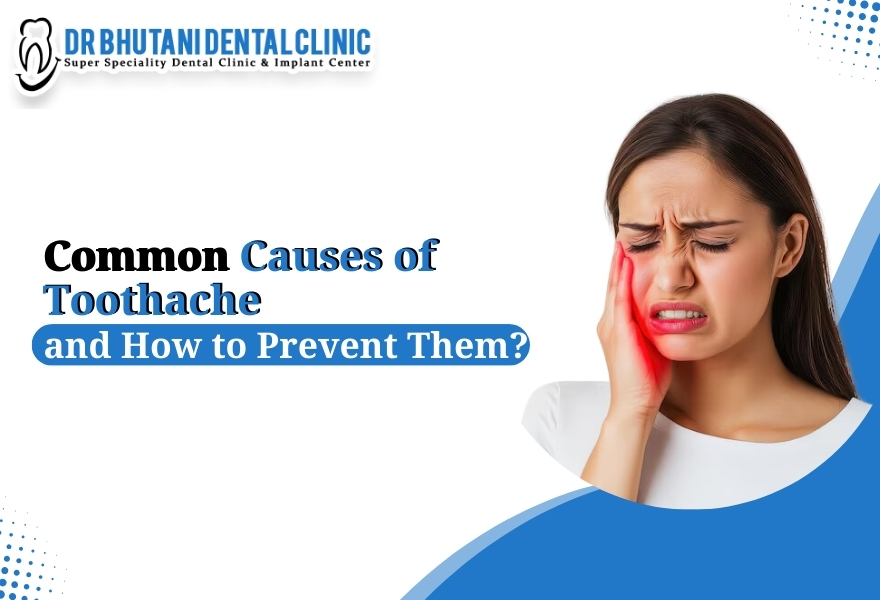When a nerve in the root of a tooth is irritated, it causes tooth pain. The most common causes of dental pain include infection, decay, injury, loss of a tooth, or growth of wisdom tooth.

Common Causes of Toothache and How to Prevent Them?
Toothaches can be distressing, affecting everything from your ability to eat comfortably to your overall quality of life. While the pain can range from mild to severe, it often signals an underlying dental issue that requires attention. Understanding the causes of toothache and how to prevent them can help maintain your oral health and avoid long-term problems.
1. Cavities in Your Teeth
Cavities are one of the most common causes of toothache. They occur when plaque, a sticky film of bacteria, builds up on your teeth and produces acid that erodes the tooth enamel. This erosion leads to tiny holes, or cavities, which can expose the inner layers of the tooth and result in pain.
Prevention Tip:
Brush twice daily with fluoride toothpaste, floss regularly, and avoid sugary snacks that contribute to plaque buildup. Visiting the dentist for regular cleanings can also help prevent cavities.
2. Swollen Gums or Bleeding Gums While Brushing
Inflamed or swollen gums often cause tooth pain, especially when accompanied by bleeding during brushing. This can be a sign of gingivitis or more severe gum disease. Gum infections lead to pain in the surrounding teeth, making it difficult to pinpoint the exact cause of discomfort.
Prevention Tip:
Practice proper oral hygiene, including brushing and flossing daily. Use a soft-bristled toothbrush to avoid gum damage, and visit your dentist regularly for professional cleanings and gum health assessments.
ALSO READ: The Stages of Gum Diseases and How to Prevent It?
3. Broken Fillings or Very Old Dental Crowns
Broken fillings or old dental crowns can expose the sensitive inner layers of a tooth, leading to toothaches. When fillings or crowns deteriorate, they no longer protect the tooth from bacteria, which can result in tooth decay and subsequent pain.
Prevention Tip:
Get your fillings and crowns checked regularly by your dentist. If you experience discomfort with a crown or filling, schedule a dental appointment promptly to prevent further damage.
4. Very Hard Brushing Leading to Wearing Off of Tooth Enamel
Brushing too hard may seem like a good way to clean your teeth, but it can actually do more harm than good. Aggressive brushing can wear down the protective enamel, leading to tooth sensitivity and pain. Once the enamel is gone, the dentin layer beneath becomes exposed, causing discomfort when consuming hot or cold foods.
Prevention Tip:
Use a soft-bristled toothbrush and gentle, circular motions when brushing. Avoid applying excessive pressure, and consider using toothpaste designed for sensitive teeth if you experience any discomfort.
5. Excessive Sugar Intake
A diet high in sugar significantly increases your risk of tooth decay, one of the leading causes of toothache. Sugary foods feed harmful bacteria in your mouth, producing acids that erode enamel and cause cavities.
Prevention Tip:
Limit your intake of sugary foods and beverages. When you do consume sugar, rinse your mouth with water afterward or brush your teeth to reduce the impact on your enamel.
6. Not Visiting the Dentist for Routine Checkups at Least Once a Year
Skipping regular dental checkups can lead to undetected dental issues that eventually cause pain. Cavities, gum disease, and other dental problems often progress without obvious symptoms until they become severe.
Prevention Tip:
Schedule routine dental checkups at least once a year, or more frequently if recommended by your dentist. These visits allow for early detection and treatment of dental issues before they cause significant discomfort.
7. Procrastination or Delaying Treatment
Delaying dental treatment not only exacerbates the problem but also increases the cost and severity of the condition. A small cavity can easily become a more complex issue requiring root canal treatment or extraction if ignored.
Prevention Tip:
Don’t delay dental treatments. If you notice any discomfort or pain, seek professional help right away. Early treatment is less painful, less costly, and far more effective in preserving your oral health.
Preventing Toothaches with Regular Dental Care
In most cases, toothaches can be avoided by maintaining a healthy oral care routine and making regular visits to your dentist. Addressing minor issues before they escalate is crucial in preventing painful and expensive treatments later on.
At Dr Bhutani Dental Clinic – best dental clinic in Delhi, we provide comprehensive dental care to help you maintain healthy teeth and gums, preventing common issues like cavities and gum disease. Regular checkups and early interventions can help keep your smile pain-free and bright for years to come.
Conclusion
Toothaches are often a result of poor dental habits, from excessive sugar intake to delayed treatment. By understanding the common causes of toothache, you can take steps to prevent them, ensuring long-term oral health. Make sure to visit your dentist regularly, brush and floss properly, and seek timely treatment for any dental issues that arise. Following these steps can help you avoid the discomfort of toothaches and maintain a healthy, pain-free smile.


 FSC India.
FSC India.